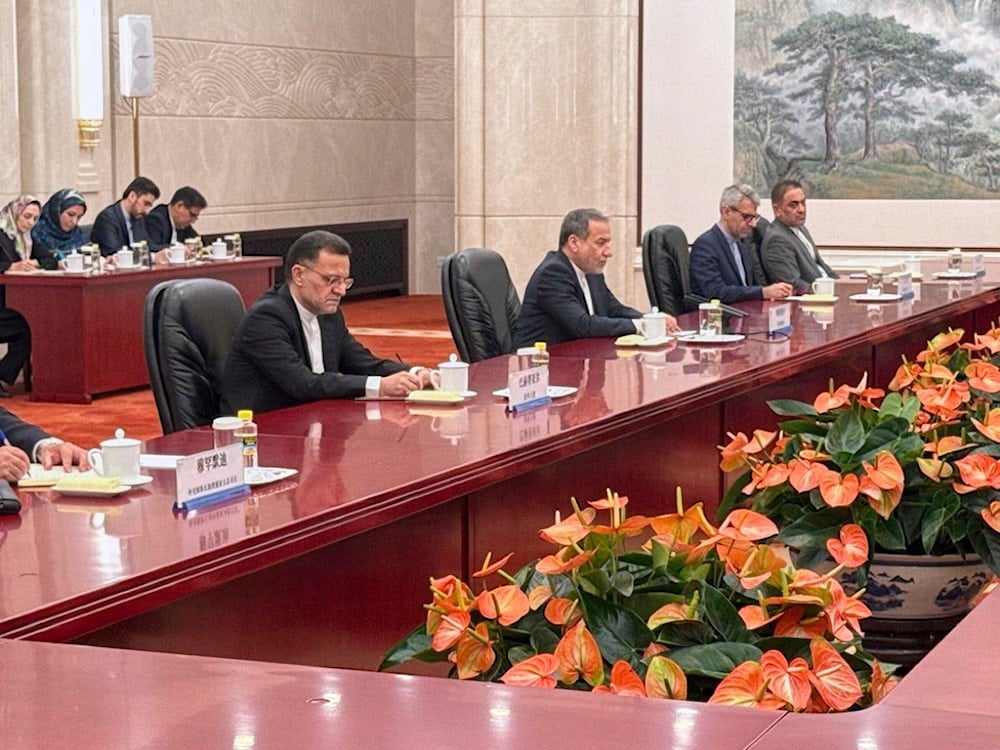Iran rules out US nuclear talks for now, but keeps diplomacy open
Iran says it has no plans to resume US nuclear talks, citing national interests, as Trump signals openness and Tehran blames US for delays amid tensions.
-

Iranian Foreign Minister Abbas Araghchi, center, and his delegation attends a meeting with China's Vice Prime Minister Ding Xuexiang, in Beijing, China, Wednesday, April 23, 2025 (Iranian Foreign Ministry)
Iran has no immediate plans to resume talks with the United States, Foreign Ministry spokesman Esmaeil Baghaei confirmed Monday, despite recent comments by US President Donald Trump suggesting Tehran is seeking dialogue over its nuclear program.
"In the current situation, we do not plan to negotiate with the United States so far," Baghaei told reporters at a press conference in Tehran. However, he added that diplomacy remains a tool for safeguarding Iran's national interests. "As soon as we come to the conclusion that we can use this tool to protect our national interests, we will certainly not hesitate."
Baghaei’s comments came in response to Trump’s July 16 statement claiming that Iran was open to reviving talks and that Washington was ready to engage. On July 18, Iranian Foreign Minister Abbas Araghchi clarified that talks could only resume if the US is willing to pursue a “mutually beneficial and balanced” nuclear agreement, stressing that talks must be held without preconditions.
The two countries have held five rounds of indirect, Oman-mediated talks aimed at reviving the nuclear deal and lifting US sanctions. A sixth round, initially set for June 15, was canceled due to escalating tensions between Tehran and the Israeli regime, tensions which Iran blamed in part on US complicity.
US-China summit prospects unconfirmed
Meanwhile, speculation over a potential meeting between Trump and Chinese President Xi Jinping remains unconfirmed. Chinese Foreign Ministry spokesman Guo Jiakun told reporters he had "no information" to share about reports of a planned summit, either ahead of or during the APEC summit in South Korea, set for October 31 to November 1.
Guo emphasized the importance of leadership diplomacy, calling it a key driver in shaping the trajectory of China-US relations.
According to The South China Morning Post, sources indicated Trump could visit China or meet Xi on the sidelines of the APEC summit to discuss strategic issues, though no official announcements have been made.
Iran agrees to talks with Europe
Iranian state television announced Monday evening that Tehran has agreed to a new round of negotiations with the three European signatories of the nuclear deal, France, Britain, and Germany, in response to a European request.
The talks are scheduled to take place Friday in Istanbul at the level of assistant foreign ministers. Iran will be represented by Deputy Foreign Minister for Political Affairs Majid Takht-e Ravanchi and Deputy Foreign Minister for Legal and International Affairs Kazem Gharibabadi.
The discussions will center on Iran’s nuclear program and are set to proceed independently of the ongoing indirect talks between Iran and the United States.
Al Mayadeen’s correspondent in Tehran confirmed that Iran agreed to the meeting following a formal request from the European Troika.
Iran urges Europe to abandon failed pressure tactics
On Friday, Iranian Foreign Minister Abbas Araghchi firmly rejected Western narratives surrounding the collapse of nuclear negotiations, placing full responsibility on the United States for both the unraveling of the 2015 nuclear agreement and the recent failure to revive diplomacy.
In a statement shared on X, Araghchi said that he held a joint teleconference with the foreign ministers of the E3, alongside the European Union’s High Representative. He emphasized that Iran has remained committed to dialogue, while it is Washington that has consistently undermined diplomatic progress.
"It was the US that withdrew from a two-year negotiated deal, coordinated by the EU in 2015, not Iran," Araghchi stated, adding, "And it was the US that left the negotiation table in June this year and chose a military option instead."
On a related note, Raouf Sheibani, the Iranian foreign minister’s special envoy for West Asia, earlier this week firmly rejected Western pressure to accept a revised nuclear deal.

 4 Min Read
4 Min Read










